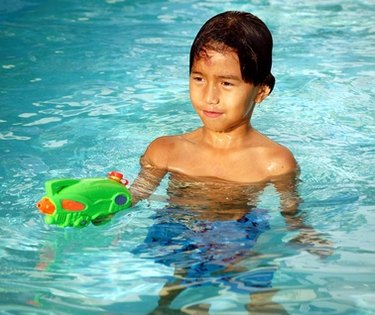
Heating the water in your above-ground pool can extend your pool season and allow more nighttime pool usage. In areas where the winters are mild, heating your pool may even allow you to use it all year long. Pool heaters are, of course, an option. Unfortunately, the cost of the heater and the energy bill required to run it may not make for a cost-effective choice. If not, you can also heat your pool with a heat pump, solar rings, solar covers and liquid treatments. Protecting your pool from the wind will also keep it warmer.
Water Heaters
Video of the Day
A water heater is the most effective way to heat your pool. A gas heater can raise the temperature of your pool water by 30 degrees Fahrenheit or more, greatly extending your pool season. These heaters use either natural gas or propane to heat the water in your pool. Solar heaters are also available, and raise pool water temperatures by as much as 20 degrees Fahrenheit. Solar heaters use solar panels installed on your roof or the side of the pool to convert solar energy into electricity to heat the pool. When necessary and allowed by local building codes, solar panels can also be mounted on your lawn. Solar systems work well in sunny areas but may disappoint in regions prone to heavy cloud cover. Heaters require careful installation and adequate breathing room around the unit. They are best installed by a professional.
Video of the Day
Heat Pumps
Heat pumps are similar to water heaters in that they require an energy source to work. While heaters generate their own heat via electricity or gas, heat pumps simply collect the heat in the air around them and channel it into the swimming pool. Heat pumps cost more to purchase and install than heaters but use less energy to run. It is important to note, however, that heat pumps work best in areas where spring and fall temperatures rarely drop below 60 degrees Fahrenheit. A heat pump can extend your pool season but is unlikely to provide adequate heating for year-round pool use.
Solar Blankets
Pools lose up to 75 percent of their heat through evaporation, which means slowing evaporation keeps pool water warmer. There are two types of blankets available to stop evaporation. One is a solid pool blanket. Solid pool blankets are heavy and require a mechanical device to roll and unroll them when covering the pool. These blankets reduce evaporation to near zero, however, and are able to hold the weight of small pets and children who may wander into the pool. Floating blankets are also available. Less expensive than solid blankets, floating blankets also greatly slow evaporation but can be rolled and unrolled by hand. Floating blankets do not, however, support any weight and will not prevent pets and children from entering the pool. Solar blankets increase the temperature of pool water by around 15 degrees Fahrenheit.
Solar Rings
No matter what type of solar blanket you choose, this type of pool cover generally requires some type of equipment or two pairs of hands. Solar rings solve this problem by covering the pool using several smaller, more manageable miniature pool covers. Solar rings are large discs that float on top of your pool water to keep it from evaporating and losing heat. Simply purchase as many rings as you need to cover your pool's surface area and toss them in your pool. The rings are small enough that adding them to and removing them from the pool is a simple one-person job. For best results, choose rings with magnets in them. The magnets help to keep the rings connected to each other, reducing the size of any gaps in water coverage.
Liquid Blankets
Those who find solar covers and rings unsightly may opt for a liquid solar blanket instead. Available at pool supply stores, liquid blankets are nontoxic liquids added to the pool that create a chemical barrier to slow evaporation and keep pool water warm. Liquid pool covers are not as effective as traditional covers or solar rings but are environmentally friendly and invisible to the eye. Liquid blankets are safe for pool equipment, as well, so using them is safe for people and pools.
Wind Shielding
Like pool covers, shielding your pool from wind will help slow evaporation and heat loss. Evaporation rates increase as water's surface area increases. Wind creates ripples and waves on the surface of a pool, and ripples and waves add surface area to the water, thus accelerating heat loss due to evaporation. Adding an enclosure around your pool will protect it from wind and slow the evaporation and heat loss. The cost of such an endeavor depends on the size of your pool, the height of your enclosure and the materials used to build it. Once installed, however, enclosures require very little maintenance and do their job well. Enclosures also allow you to swim in the rain.